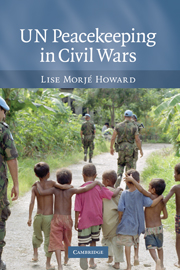Book contents
- Frontmatter
- Contents
- List of tables and appendices
- List of acronyms
- Acknowledgments
- 1 Introduction: success, failure, and organizational learning in UN peacekeeping
- 2 The failures: Somalia, Rwanda, Angola, Bosnia
- 3 Namibia: the first major success
- 4 El Salvador: centrally propelled learning
- 5 Cambodia: organizational dysfunction, partial learning, and mixed success
- 6 Mozambique: learning to create consent
- 7 Eastern Slavonia: institution-building and the limited use of force
- 8 East Timor: the UN as state
- 9 The ongoing multidimensional peacekeeping operations
- 10 Conclusion: two levels of organizational learning
- Appendices
- Bibliography
- Index
1 - Introduction: success, failure, and organizational learning in UN peacekeeping
Published online by Cambridge University Press: 05 June 2012
- Frontmatter
- Contents
- List of tables and appendices
- List of acronyms
- Acknowledgments
- 1 Introduction: success, failure, and organizational learning in UN peacekeeping
- 2 The failures: Somalia, Rwanda, Angola, Bosnia
- 3 Namibia: the first major success
- 4 El Salvador: centrally propelled learning
- 5 Cambodia: organizational dysfunction, partial learning, and mixed success
- 6 Mozambique: learning to create consent
- 7 Eastern Slavonia: institution-building and the limited use of force
- 8 East Timor: the UN as state
- 9 The ongoing multidimensional peacekeeping operations
- 10 Conclusion: two levels of organizational learning
- Appendices
- Bibliography
- Index
Summary
Basic questions and the argument in brief
Civil war is the most important and troubling problem in international life today. Aside from the tragic killing and injury of innocent civilians, violent civil conflicts inspire lingering, seemingly intractable ills such as state collapse, corruption, dire poverty, rampant injustice, dislocation, environmental degradation, and disease, all of which may in turn instigate renewed and spreading conflict, international crime, and terrorist activity.
Given the extreme, cyclical, and burgeoning problems associated with civil wars, what mechanisms do we have to stop such conflicts? The most oft-used mechanism is United Nations (UN) multidimensional peacekeeping. Multidimensional peacekeeping operations endeavor to rebuild the basic institutions of the post-civil war state. These missions are large and complex, involving sizable political, military, police, refugee, humanitarian, electoral, and often human rights components. Despite the UN's own problems, and despite the difficulties associated with peacekeeping, we simply have not yet invented better international mechanisms to bring order to the anarchy of civil wars. It is therefore of critical importance that we analyze and improve our understanding of UN peacekeeping. When has UN peacekeeping been successful? What are the sources of success and failure? How can the UN learn to engage better in peacekeeping? What are the types of learning in which the UN engages? These are the critical questions asked in this book.
- Type
- Chapter
- Information
- UN Peacekeeping in Civil Wars , pp. 1 - 20Publisher: Cambridge University PressPrint publication year: 2007



